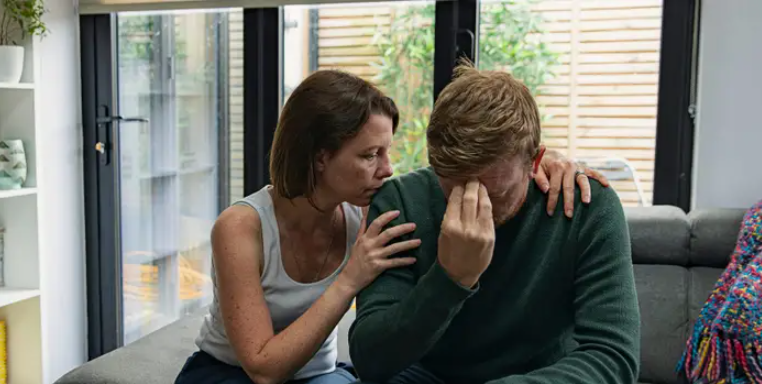Anxiety is a terrible feeling. Sometimes, anxious people feel it even when there’s nothing to worry about. It always sucks to have your brain turn against you and make you scared of something you shouldn’t even be afraid of.
So when dealing with someone who has anxiety, you should understand that they aren’t choosing to be anxious, but it’s their brain that triggers them to. Begin with having this idea in your mind so that you’re compassionate to them, then calm them down by softly reassuring them.
In this article, we will show you some of the quotes you can use to calm an anxious person down.
Recognizing Their Feelings: Validating Their Experience
Telling an anxious person that it’s okay to worry will make them feel understood and calming down will be easier. Here are some quotes that show validation of an anxious person’s experience.
- It’s okay to feel what you’re feeling. What you need to do right now is to try and regulate that feeling.
- What you’re feeling right now is anxiety and it’s okay to feel it.
- How you’re feeling isn’t your fault and I’m here for you.
- You’re handling this well, are you feeling calm when I hold your hands?
- It’s okay if you want to cry again.
- Don’t hold back what you’re feeling, I’ll help you regulate it.
- You can cry if it feels right. I’ll get you some tissues.
- You’re not crazy. This is an anxiety attack and I’m here to help you overcome it.
- We’re going to take some deep breaths. I’ll do it with you on the count of three.
Words of Comfort: Phrases That Can Soothe Anxiety
After validation, anxious people need comforting words to assure them that things will work out. This will become the key to their mental jail of thinking that they are stuck in that situation.
- Everything will be okay if you move together with me through your anxiety.
- You can lean on my shoulder if it helps you calm down.
- Look at me. Let’s get out of here so we can be away from the public. Follow me and I’ll hold your hand.
- I’m hugging you now. This is all going to be alright.
- Just let the tears flow and don’t hold back. There’s no shame in crying.
- Your anxiety can’t help solve your problems. It’s only escalating the situation by giving you the wrong ideas.
- Do you need me to get you something to eat or drink?
- It’s normal to experience this feeling and so many other people experience it.
- People have experienced this and gotten through it, and there’s all the help you need.
- This can and will work out.
Encouraging Mindfulness: Promoting Present-Moment Awareness
Most anxiety progresses because the anxious person usually starts imagining exaggerated scenarios of what could follow what they are worrying about. We’ve listed some quotes that promote present-moment awareness in the person.
- Remember that I am here with you right now.
- Your thoughts are lying to you. We can handle all of this.
- There is a solution on the other side of the reality your brain is painting.
- Try listening to the sound of your breathing and your heartbeat.
- You are not alone in your thoughts. I am right here and you can be here too.
- You are doing just fine with your breathing. Can you open your eyes now that you’re calmer?
- Look around, I care because I am here. We can figure this out.
- Can you tell me what you were thinking of that caused anxiety? We can reason out possible solutions.
- Peace is right outside your fearful thoughts.
- Remember your close friends and family. They do care about you and will help you.
Offering Reassurance: Providing Support and Security
After leading the anxious person back to the situation in reality, you’ll have to give them a sense of security so that their intrusive thoughts don’t come back. Here are some things you can say to make them feel secure.
- What you’ve experienced is okay. I’ll recommend some doctors to visit if it occurs too much.
- This situation will remain between us and is safe with me.
- You’ll be okay. You’ve done great calming down but we can take more breaths if you want.
- I’ll walk with you down the street for a bit before I go.
- Nothing should take away your peace including anxiety. If it doesn’t go away it’s fine to seek medical assistance.
- You did great handling your breathing exercises. It’s okay if you want to stay here some more. I’ll look out.
- I’ve recommended a soothing playlist that will help you out.
- Are you ready to get out of here? It’s perfectly fine if you aren’t, I’m in no rush.
- Diseases need treatment and seeking help with anxiety is just like seeking treatment.
- No, you’re not crazy or dramatic. You have anxiety and it’s perfectly fine to seek medical assistance for it.
Suggesting Coping Strategies: Practical Tips for Managing Anxiety
Managing anxiety will require a couple of practical tips you can use because it happens spontaneously most times. These are our suggestions for helping you manage anxiety.
- Immobilize or reduce movement. Immobilization includes having a seat if you’re in a public place, lying down, or standing still. This will be the first step to eliminating the brain’s rushing thoughts.
- Head to a serene place. This could just be a quieter place without all the hustle and bustle. If you’re able to find a totally quiet room then the better, but have someone with the anxious person since total quietness can make the intrusive thoughts louder.
- Ask the person to close their eyes while taking deep slow breaths. This will remind them of their physical presence and get them out of their brain. Softly touching or holding their hands, rubbing their backs, and hugging is also important in making them aware of their physical presence.
- Listen to slow and soft music. Piano music is mostly used but harp and guitar can also work. Some musicians have also learned to make smooth beats, so you can also have a listen to preferably the ones without lyrics. Today, you can find these calm songs and playlists online in various social apps.
- Make the person aware that their current emotion is anxiety and it is an exaggerated response by their brain. This will help in the process of getting them out of their head and coming back to reality. It will also open their eyes to see that the situation can be managed or even solved.
- Be soft but firm when giving these instructions to get them to listen to you and follow them.
- Walk the person through different ideas to solve the situation causing anxiety. Once they calm down, then you can leave them.
The Power of Breathing: Guiding Them Through Relaxation Techniques
As we’ve mentioned earlier, breathing brings them back to being aware of their physical presence.
When they are breathing, make sure that they are doing it slowly and steadily. This will reduce the risk of having panic attacks or hyperventilating.
Make sure they aren’t shaking as they take in the air too. If they do, you can hold them still by firmly holding their shaking hands or shoulders if their whole body is shaking. Ask them to try to control their shaking.
The breaths should be deep and last about 5 seconds. Holding deep breaths will help them stabilize and make the brain focus on breathing instead of thinking.
Avoiding Common Pitfalls: What Not to Say to Someone with Anxiety
When it comes to anxiety, one wrong phrase and you can escalate the emotion. Apart from the obvious mean phrases you can say to a person with anxiety, there are other common things people say but shouldn’t.
- “You’re exaggerating.” This makes them invalidated and can lead to more intrusive thoughts.
- “You’re seeking attention.” This also invalidates them and hurts their feelings.
- “You’re making people uncomfortable.” Saying this will make them feel like they are bothering people. They won’t ask for help and may end up making hasty decisions in their anxious state. Simply take them to a secluded place like the bathroom.
- “Don’t cry.” This will make them bottle up the pent-up emotions caused by the anxiety. Tell them that it’s okay to cry and that they can let it out softly.
Encouraging Professional Help: When to Seek Further Assistance
If anxiety reoccurs frequently, it may be a sign of trauma or an undiagnosed mental condition. You can get these people further medical help like therapy to determine the underlying causes and prescribe anxiety-relieving medicine. Some of these medicines can be carried around for convenience in case of an anxious attack.
MRI brain scans and electrocardiograms can also be done to determine the working of the brain in processing information to note any neurological or vascular abnormalities.
Conclusion: The Importance of Empathy and Patience in Calming Anxiety
We hope that all we have discussed in this article will help you manage anxiety properly. You should note that an important quality of someone who calms people’s anxiety is that they should be patient and empathetic. Patience will be required because the anxious person may not immediately listen to your instructions and even be vulgar during their anxious attacks. Empathy will help you handle them how you would have wanted to be handled if you had anxiety. When you have these important qualities plus follow our tips and guidelines, you will calm an anxious person better.



